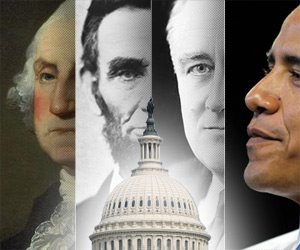As I alluded to in the first post, one of the topics I am especially interested in is the historical context of competitiveness policy in the United States. I think that some of the perspectives of the early federalists especially, but also Jefferson, and the whigs, have important insights for modern American policymaking. Unfortunately, I think a lot of this insight was dashed to the side with the evolution of the whigs into the new Republican Party in the middle of the 19th century.
"Pro-market economic planning" as a movement did seem to reemerge in the Progressive era, and especially with the rising influence of Keynesians in the Roosevelt administration, but I'm still afraid we've lost the old federalist distinctions in this policy arena. Federalists embraced liberty and states rights as it was enshrined in the Constitution more than most people give them credit for, but they still had a vision for a national economy that was stabilized and promoted by the federal government. A social-democratic agenda with Jeffesonian sensibilities, if you will - very different from what you might call "big government liberals" in the 21st century. I think this overarching "federalist" perspective is still apparent in what we occasionally call "Blue Dog Democrats" - Webb, Warner, Lieberman, and their ilk - as well as some moderate Republicans.
This is such an amorphous topic and I know only bits and pieces about it as yet. But I do have one thought to share in this post - that is that to understand the essentially republican nature of federalist economic policy, we need to understand colonial anti-mercantilism as a perspective that is very distinct from laissez-faire capitalism. Federalists were anti-mercantilist,
but not laissez-faire. Jeffersonian republicans were anti-mercantilist
and laissez-faire. However, none of these labels fit exactly because all of these political movements were proto-industrial.
In our post-imperial society, however, federalist anti-mercantilism isn't truly appreciated, and the dichotomy is therefore reduced to pro- and anti-laissez-faire. When that is the dichotomy, it's no wonder that the federalists begin to look like big-government economic planners, rather than the more nuanced perspective that they actually represented.
Mercantilism, as understood by colonial America, is essentially state favoritism, a point convincingly made by Licht (1995). Mercantilism was not conceived of as being anti-trade (quite the opposite - the point was to trade, and mercantilist England was hyper-commercial). Contrary to popular belief, imperial England did not oppose free trade in the abstract - they simply opposed free trade for some merchants - namely, colonial merchants. Mercantilism was not so much anti-trade as it was selectively-pro-trade. This impoverished American merchants relative to their English counterparts and kept the American colonial economy underdeveloped, and this infuriated the early patriots. It's easy to see why, 250 years later, we would get the impression that England was anti-trade and therefore the early Republic was fundamentally pro-free trade (until Henry Clay and John Quincy Adams mucked it all up), but it just isn't so. There was no groundswell for or against free trade - there was a diversity of opinion on it in the early republic. What was strongly opposed by everyone was a government that would patronize some businesses at the expense of others, and it was in opposition to this type of government that the federalists and the Jeffersonians were in agreement.
So I would argue that the dichotomy in the early republic was not between liberty-loving republicans and quasi-monarchical federalists that would soon be swept from the scene. The dichotomy was between Jeffersonian republicans and a sophisticated but small band of political moderates who stressed economic "balance" and the undiscriminating promotion of economic activity. This was in stark contrast to English mercantilism, and it was a passionate demonstration of state-directed growth consistent with liberty and a small government. When the federalists were subsumed by the wave of Jeffersonian republicanism that washed over the nation, I think we really lost their legacy forever. When the whigs reemerged from the republican landslide, they presented a perspective that was very different from the federalists. The whigs, and Lincoln's Republicans who would follow them, represented the big-government, anti-market, anti-trade economic planning and protection that Americans today have such an antipathy towards.
I don't think we've really seen a resurgence of the unique perspective of the federalists - balanced, state sponsored growth that eschews special treatment and direct state support, and respects the limits placed on government by the Constitution. We get an important glimpse into federalist economic thought when we investigate the differences between the federalists and the loyalists on English mercantilism. When we view mercantilism as an economic policy that is more nuanced than "anti-trade" we start to see the true contours of how federalists thought the state should interact with the economy.





